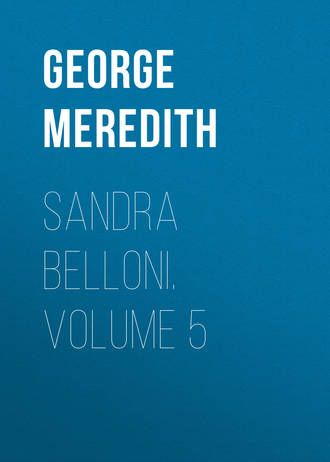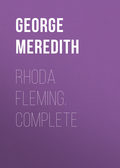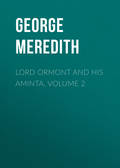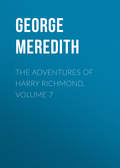
George Meredith
Sandra Belloni. Volume 5
"Dearest, dearest Wilfrid! can you, can I, can any one of us settle—that is, involve another life in doubt while doubt exists? Papa insists; his argument is, "Now, now, and no delay." I accuse nothing but his love. Excessive love is perilous for principle!
"You have understood me, I know, and forgiven me for writing so nakedly. I dare not reperuse it. You must satisfy him that Lady C. has fixed a date. Adela is incomprehensible. One day she sees a friend in Lady C., and again it is an enemy. Papa's immediate state of health is not alarming. Above all things, do not let the girl come near him. Papa will send the cheque you required."
"When?" Wilfrid burst out upon Arabella's affectionate signature. "When will he send it? He doesn't do me the honour to mention the time. And this is his reply to a third application!"
The truth was that Wilfrid was in dire want of tangible cash simply to provision his yacht. The light kindled in him by this unsatisfied need made him keen to comprehend all that Arabella's attempt at plain writing designed to unfold.
"Good God, my father's the woman's trustee!" shaped itself in Wilfrid's brain.
And next: "If he marries her we may all be as poor as before." That is to say, "Honour may be saved without ruin being averted."
His immediate pressing necessity struck like a pulse through all the chords of dismal conjecture. His heart flying about for comfort, dropped at Emilia's feet.
"Bella's right," he said, reverting to the green page in his hand; "we can't involve others in our scrape, whatever it may be."
He ceased on the spot to be at war with himself, as he had been for many a day; by which he was taught to imagine that he had achieved a mental indifference to misfortune. This lightened his spirit considerably. "So there's an end of that," he emphasized, as the resolve took form to tell Lady Charlotte flatly that his father was ruined, and that the son, therefore, renounced his particular hope and aspiration.
"She will say, in the most matter-of-fact way in the world, "Oh, very well, that quite alters the case," said Wilfrid aloud, with the smallest infusion of bitterness. Then he murmured, "Poor old governor!" and wondered whether Emilia would come to this place according to his desire. Love, that had lain crushed in him for the few recent days, sprang up and gave him the thought, "She may be here now;" but, his eyes not being satiated instantly with a sight of her, the possibility of such happiness faded out.
"Blessed little woman!" he cried openly, ashamed to translate in tenderer terms the soft fresh blossom of love that his fancy conjured forth at the recollection of her. He pictured to himself hopefully, moreover, that she would be shy when they met. A contradictory vision of her eyes lifted hungry for his first words, or the pressure of his arm displeased him slightly. It occurred to him that they would be characterized as a singular couple. To combat this he drew around him all the mysteries of sentiment that had issued from her voice and her eyes. She had made Earth lovely to him and heaven human. She—what a grief for ever that her origin should be what it was! For this reason:—lovers must live like ordinary people outwardly; and say, ye Fates, how had she been educated to direct a gentlemen's household?
"I can't exist on potatoes," he pronounced humorously.
But when his thoughts began to dwell with fitting seriousness on the woman-of-the-world tone to be expected from Lady Charlotte, he folded the mental image of Emilia closely to his breast, and framed a misty idea of a little lighted cottage wherein she sat singing to herself while he was campaigning. "Two or three fellows—Lumley and Fredericks—shall see her," he thought. The rest of his brother officers were not even to know that he was married.
His yacht was lying in a strip of moonlight near Sir Twickenham's companion yawl. He gave one glance at it as at a history finished, and sent up his name to Lady Charlotte.
"Ah! you haven't brought the good old dame with you?" she said, rising to meet him. "I thought it better not to see her to-night."
He acquiesced, mentioning the lateness of the hour, and adding, "You are alone?"
She stared, and let fall "Certainly," and then laughed. "I had forgotten your regard for the proprieties. I have just sent my maid for Georgiana; she will sleep here. I preferred to come here, because those people at the hotel tire me; and, besides, I said I should sleep at the villa, and I never go back to people who don't expect me."
Wilfrid looked about the room perplexed, and almost suspicious because of his unexplained perplexity. Her (as he deemed it—not much above the level of Mrs. Chump in that respect) aristocratic indifference to opinion and conventional social observances would have pleased him by daylight, but it fretted him now.
Lady Charlotte's maid came in to say that Miss Ford would join her. The maid was dismissed to her bed. "There's nothing to do there," said her mistress, as she was moving to the folding-doors. The window facing seaward was open. He went straight to it and closed it. Next, in an apparent distraction, he went to the folding-doors. He was about to press the handle, when Lady Charlotte's quiet remark, "My bedroom," brought him back to his seat, crying pardon.
"Have you had news?" she inquired. "You thought that a letter might be there. Bad, is it?"
"It is not good," he replied, briefly.
"I am sorry."
"That is—it tells me—" (Wilfrid disciplined his tongue) "that I—we are—a lieutenant on half-pay may say that he is ruined, I suppose, when his other supplies are cut off!…"
"I can excuse him for thinking it," said Lady Charlotte. She exhibited no sign of eagerness for his statement of facts.
Her outward composure and a hard animation of countenance (which, having ceased the talking within himself, he had now leisure to notice) humiliated him. The sting helped him to progress.
"I may try to doubt it as much as I please, to avoid seeing what must follow…. I may shut my eyes in the dark, but when the light stares me in the face…I give you my word that I have not been justified even in imagining such a catastrophe."
"The preamble is awful," said Lady Charlotte, rising from her recumbent posture.
"Pardon me; I have no right to intrude my feelings. I learn to-day, for the first time, that we are—are ruined."
She did not lift her eyebrows, or look fixedly; but without any change at all, said, "Is there no doubt about it?"
"None whatever." This was given emphatically. Resentment at the perfect realization of her anticipated worldly indifference lent him force.
"Ruined?" she said.
"Yes."
"You I'll be more so than you were a month ago. I mean, you tell me nothing new, I have known it."
Amid the crush and hurry in his brain, caused by this strange communication, pressed the necessity to vindicate his honour.
"I give you the word of a gentleman, Lady Charlotte, that I came to you the first moment it has been made known to me. I never suspected it before this day."
"Nothing would prompt me to disbelieve that." She reached him her hand.
"You have known it!" he broke from a short silence.
"Yes—never mind how. I could not allude to it. Of course I had to wait till you took the initiative."
The impulse to think the best of what we are on the point of renouncing is spontaneous. If at the same time this object shall exhibit itself in altogether new, undreamt-of, glorious colours, others besides a sentimentalist might waver, and be in some danger of clutching it a little tenderly ere it is cast off.
"My duty was to tell you the very instant it came to my knowledge," he said, fascinated in his heart by the display of greatness of mind which he now half divined to be approaching, and wished to avoid.
"Well, I suppose that is a duty between friends?" said she.
"Between friends! Shall we still—always be friends?"
"I think I have said more than once that it won't be my fault if we are not."
"Because, the greater and happier ambition to which I aspired…" This was what he designed to say, sentimentally propelled, by way of graceful exit, and what was almost printed on a scroll in his head for the tongue to read off fluently. He stopped at 'the greater,' beginning to stumble —to flounder; and fearing that he said less than was due as a compliment to the occasion, he said more.
By no means a quick reader of character, Lady Charlotte nevertheless perceived that the man who spoke in this fashion, after what she had confessed, must be sentimentally, if not actually, playing double.
Thus she came to his assistance: "Are you begging permission to break our engagement?"
"At least, whatever I do get I must beg for now!" He took refuge adroitly in a foolish reply, and it served him. That he had in all probability lost his chance by the method he had adopted, and by sentimentalizing at the wrong moment, was becoming evident, notwithstanding. In a sort of despair he attempted comfort by critically examining her features, and trying to suit them to one or other of the numerous models of Love that a young man carries about with him. Her eyes met his, and even as he was deciding against her on almost every point, the force of their frankness held his judgement in suspense.
"The world is rather harsh upon women in these cases," she said, turning her head a lithe, with a conscious droop of the eyelids. "I will act as if we had an equal burden between us. On my side, what you have to tell me does not alter me. I have known it…. You see that I am just the same to you. For your part, you are free, if you please. That is fair dealing, is it not?"
The gentleman's mechanical assent provoked the lady's smile.
But Wilfrid was torn between a profound admiration of her and the galling reflection that until she had named the engagement, none had virtually existed which diplomacy, aided by time and accident, might not have stopped.
"You must be aware that I am portionless," she continued. "I have—let me name the sum—a thousand pounds. It is some credit to me that I have had it five years and not spent it. Some men would think that a quality worth double the amount. Well, you will make up your mind to my bringing you no money;—I have a few jewels. En revanche, my habits are not expensive. I like a horse, but I can do without one. I like a large house, and can live in a small one. I like a French cook, and can dine comfortably off a single dish. Society is very much to my taste; I shall indulge it when I am whipped at home."
Wilfrid took her hand and pressed his lips to the fingers, keeping his face ponderingly down. He was again so divided that the effort to find himself absorbed all his thinking faculties.
At last he muttered: "A lieutenant's pay!"—expecting her to reply, "We can wait," as girls do that find it pleasant to be adored by curates, Then might follow a meditative pause—a short gaze at her, from which she could have the option of reflecting that to wait is not the privilege of those who have lived to acquire patience. The track he marked out was clever in a poor way; perhaps it was not positively unkind to instigate her to look at her age: but though he read character shrewdly, and knew hers pretty accurately, he was himself too much of a straw at the moment to be capable of leading-moves.
"We can make up our minds, without great difficulty, to regard the lieutenant's pay as nothing at all," was Lady Charlotte's answer. "You will enter the Diplomatic Service. My interest alone could do that. If we are married, there would be plenty to see the necessity for pushing us. I don't know whether you could keep the lieutenancy; you might. I should not like you to quit the Army: an opening might come in it. There's the Indian Staff—the Persian Mission: they like soldiers for those Eastern posts. But we must take what we can get. We should, anyhow, live abroad, where in the matter of money society is more sensible. We should be able to choose our own, and advertize tea, brioche, and conversation in return for the delicacies of the season."
"But you, Charlotte—you could never live that life!" Wilfrid broke in, the contemplation of her plain sincerity diminishing him to himself. "It would drag you down too horribly!"
"Remorse at giving tea in return for dinners and balls?"
"Ah! there are other things to consider."
She blushed unwontedly.
Something, lighted by the blush, struck him as very feminine and noble.
"Then I may flatter myself that you love me?" he whispered.
"Do you not see?" she rejoined. "My project is nothing but a whim—a whim."
The divided man saw himself whole, if not happy in the ranks of Diplomacy, with a resolute, frank, faithful woman (a lady of title) loving him, to back him. Fortune shone ahead, and on the road he saw where his deficiencies would be filled up by her. She was firm and open —he irresolute and self-involved. Animal courage both possessed. Their differences were so extreme that they met where they differed. It struck him specially now that she would be like Day to his spirit in continued intercourse. Young as he was he had wisdom to know the right meaning of the word "helpmate." It was as if the head had dealt the heart a blow, saying, "See here the lady thou art to serve." But the heart was a surly rebel. Lady Charlotte was fully justified in retorting upon his last question: "I think I also should ask, do you love me? It is not absolutely imperative for the occasion or for the catastrophe, I merely ask for what is called information."
And yet, despite her flippancy, which was partly designed to relieve his embarrassment, her hand was moist and her eyes were singularly watchful.
"You who sneer at love!" He gave a musical murmur.
"Not at all. I think it a very useful part of the capital to begin the married business upon."
"You unsay your own words."
"Not 'absolutely imperative,' I think I said, if I remember rightly."
"But I take the other view, Charlotte."
"You imagine that there must be a little bit of love."
"There should be no marriage without it."
"On both sides?"
"At least, if not on both sides, one should bring such a love."
"Enough for two! So, then, we are not to examine your basket?"
Touched by the pretty thing herein implied, he squeezed her hand.
"This is the answer?" said she.
"Can you doubt me?"
She rose from her seat. "Oh! if you talk in that style, I really am tempted to say that I do. Are there men—women and women—men? My dear Wilfrid, have we changed parts to-night?"
His quickness in retrieving a false position, outwardly, came to his aid. He rose likewise, and, while perfecting the minor details of an easy attitude against the mantelpiece, said: "I am so constituted, Charlotte, that I can't talk of my feelings in a business tone; and I avoid that subject unless… You spoke of a basket just now. Well, I confess I can't bring mine into the market and bawl out that I have so many pounds' weight of the required material. Would a man go to the market at all if he had nothing to dispose of? In plain words—since my fault appears to be, according to your reading, in the opposite direction—should I be here if my sentiments could not reply eloquently to your question?"
This very common masterpiece of cunning from a man in a corner, which suggests with so persuasive an air that he has ruled his actions up to the very moment when he faces you, and had almost preconceived the present occasion, rather won Lady Charlotte; or it seemed to, or the scene had been too long for her vigilance.
"In the affirmative?" she whispered, coming nearer to him.
She knew that she had only to let her right shoulder slip under his left arm, and he would very soon proclaim himself her lover as ardently as might be wished. Why did she hesitate to touch the blood of the man? It was her fate never to have her great heart read aright. Wilfrid could not know that generosity rather than iciness restrained her from yielding that one unknown kiss which would have given the final spring to passion in his breast. He wanted the justification of his senses, and to run headlong blindly. Had she nothing of a woman's instinct?
"In the affirmative!" was his serene reply.
"That means "Yes." Her tone had become pleasantly soft.
"Yes, that means 'Yes,'" said he.
She shut her eyes, murmuring, "How happy are those who hear that they are loved!" and opening them, all her face being red, "Say it!" she pleaded. Her fingers fell upon his wrist. "I have this weakness, Wilfrid; I wish to hear you say it."
The flush of her face, and tremour of her fingers, told of an unimagined agitation hardly to be believed, though seen and felt. Yet, still some sign, some shade of a repulsion in her figure, kept him as far from her as any rigid rival might have stipulated for.
The interrogation to the attentive heavens was partially framed in his mind, "How can I tell this woman I love her, without…" without putting his arm about her waist, and demonstrating it satisfactorily to himself as well as to her? In other words, not so framed, "How, without that frenzy which shall make me forget whether it be so or not?"
He remained in his attitude, incapable of moving or speaking, but fancying, that possibly he was again to catch a glimpse of the vanished mountain nymph, sweet Liberty. Her woman's instinct warmed more and more, until, if she did not quite apprehend his condition, she at least understood that the pause was one preliminary to a man's feeling himself a fool.
"Dear Wilfrid," she whispered, "you think you are doubted. I want to be certain that you think you have met the right woman to help you, in me."
He passed through the loophole here indicated, and breathed.
"Yes, Charlotte, I am sure of that. If I could be only half as worthy! You are full of courage and unselfishness, and, I could swear, faithful as steel."
"Thank you—not dogs," she laughed. "I like steel. I hope to be a good sword in your hand, my knight—or shield, or whatever purpose you put me to."
She went on smiling, and seeming to draw closer to him and throw down defences.
"After all, Wilfrid, the task of loving your good piece of steel won't be less thoroughly accomplished because you find it difficult. Sir, I do not admit any protestation. Handsome faces, musical voices, sly manners, and methods that I choose not to employ, make the business easy to men."
"Who discover that the lady is not steel," said Wilfrid. "Need she, in any case, wear so much there?"
He pointed, flittingly as it were, with his little finger to the slope of her neck.
She turned her wrist, touching the spot: "Here? You have seen, then, that it is something worn?"
There followed a delicious interplay of eyes. Who would have thought that hers could be sweet and mean so much?
"It is something worn, then? And thrown aside for me only, Charlotte?"
"For him who loves me," she said.
"For me!"
"For him who loves me," she repeated.
"Then it is for me!"
She had moved back, showing a harder figure, or the "I love you, love you!" would have sounded with force. It came, though not so vehemently as might have been, to the appeal of a soft fixed look.
"Yes, I love you, Charlotte; you know that I do."
"You love me?"
"Yes."
"Say it."
"I love you! Dead, inanimate Charlotte, I love you!"
She threw out her hand as one would throw a bone to a dog.
"My living, breathing, noble Charlotte," he cried, a little bewitched, "I love you with all my heart!"
It surprised him that her features should be gradually expressing less delight.
"With all your heart?"
"Could I give you a part?"
"It is done, sometimes," she said, mock-sadly. Then, in her original voice: "Good. I never credited that story of you and the girl Emilia. I suppose what people say is a lie?"
Her eyes, in perfect accordance with the tone she had adopted, set a quiet watch on him.
"Who says it?" he thundered, just as she anticipated.
"It's not true?"
"Not true!—how can it be true?"
"You never loved Emilia Belloni?—don't love her now?—do not love her now? If you have ever said that you love Emilia Belloni, recant, and you are forgiven; and then go, for I think I hear Georgiana below. Quick! I am not acting. It's earnest. The word, if you please, as you are a gentleman. Tell me, because I have heard tales. I have been perplexed about you. I am sure you're a manly fellow, who would never have played tricks with a girl you were bound to protect; but you might have—pardon the slang—spooned,—who knows? You might have been in love with her downright. No harm, even if a trifle foolish; but in the present case, set my mind at rest. Quick! There are both my hands. Take them, press them, and speak."
The two hands were taken, but his voice was not so much at command. No image of Emilia rose in his mind to reproach him with the casting over of his heart's dear mistress, but a blind struggle went on. It seemed that he could do what he dared not utter. The folly of lips more loyal than the spirit touched his lively perception; and as the hot inward struggle, masked behind his softly-playing eyes, had reduced his personal consciousness so that if he spoke from his feeling there was a chance of his figuring feebly, he put on his ever-ready other self:—
"Categorically I reply: Have I loved Miss Emilia Belloni?—No. Do I?– No. Do I love Charlotte Chillingworth?—Yes, ten thousand times! And now let Britomart disarm."
He sought to get his reward by gentle muscular persuasion. Her arms alone yielded: and he judged from the angle of the neck, ultra-sharp though it was, that her averted face might be her form of exhibiting maidenly reluctance, feminine modesty. Suddenly the fingers in his grasp twisted, and not being at once released, she turned round to him.
"For God's sake, spare the girl!"
Emilia stood in the doorway.







